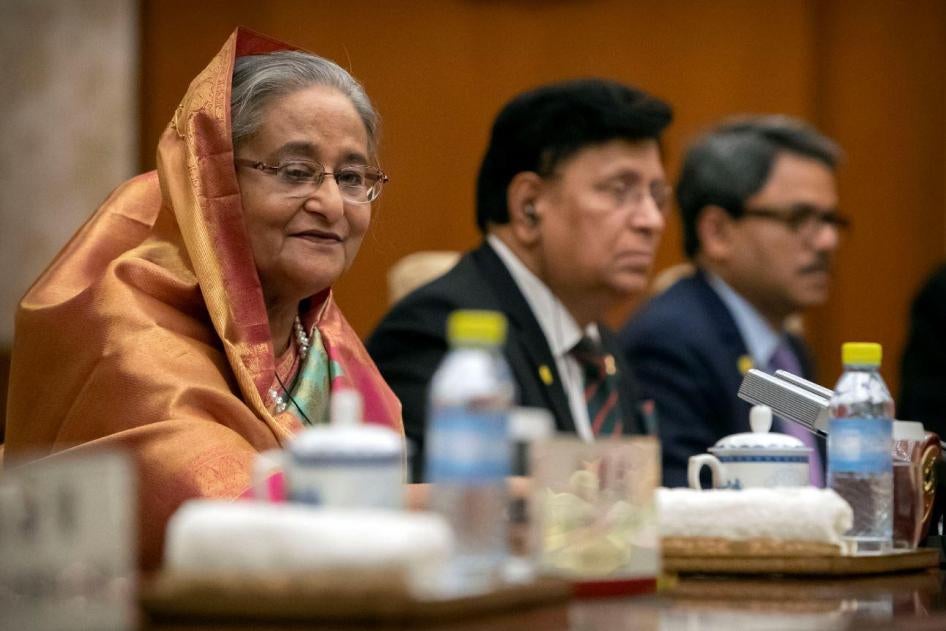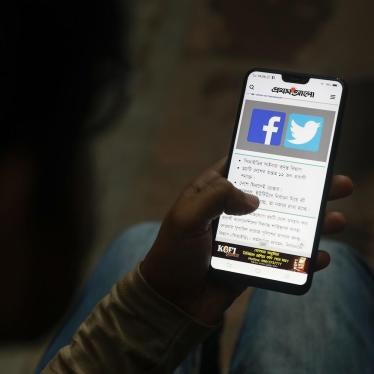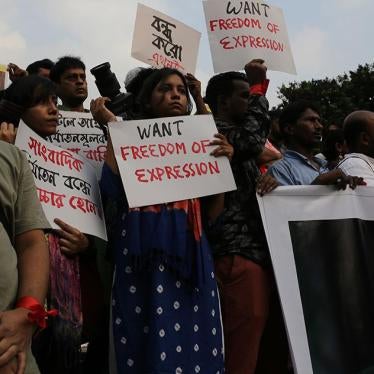Keeping the Internet free from incitement to violence, hate speech and child pornography is a priority around the world. It is particularly important in countries that have seen rapid and immense growth in Internet usage. Unfortunately, all too often, countries adopt laws and policies that appear to target online evils, but instead punish people who criticize the government or its leaders.
This is the case in Bangladesh, where more than half the population is now online, up from under 15 percent five years ago — and where the space for free speech has shrunk at an alarming rate in the process. The ruling Awami League has played whack-a-mole with critics in its efforts to consolidate power, swiftly squashing many of those who risk raising their voices. In one shocking case from last summer, Shahidul Alam, an internationally celebrated artist and activist, was arrested after criticizing the police and Awami League supporters for attacking students, including schoolchildren, who staged a protest demanding traffic safety. He was held for more than 100 days before he was released on bail. He says he was beaten in custody.
Alam was arrested under Section 57 of the Information and Communication Technology Act, a law so terribly misused that Bangladesh’s parliament repealed it. In its place, it adopted the Digital Security Act in October 2018. This month, Prime Minister Sheikh Hasina’s son and adviser on information and communication technology, Sajeeb Wazed, defended the Digital Security Act in an op-ed in the Washington Times, writing that it was passed “to protect citizen data and privacy and to safeguard against false digital publications that incite violence.”
However, in many ways the new law has tightened the government’s chokehold on the Internet. It makes “propaganda” against “the liberation war, the spirit of the liberation war, the father of the nation, national anthem, or national flag” punishable with up to life in prison. Publishing content that “hurts religious sentiments or religious values” or “destroys communal harmony, or creates unrest or disorder” is punishable with up to 10 years in prison.
Recent cases under the act include the arrest of a human rights activist, Abdul Kaium, in May over accusations of disseminating “false or fear inducing information/data” and defamation. Kaium was released on bail on July 3 after being held for nearly two months. Also in May, a well-known poet, Henry Sawpon, was arrested over a Facebook post criticizing a local Roman Catholic bishop. Sawpon is accused of defamation, “hurting religious values or sentiments” and “causing deterioration of law and order.” After national elections in December, which were widely considered to have been fraudulent, a journalist, Hedait Hossain Molla, was arrested for reporting that the total number of votes cast in one constituency was higher than the number of actual eligible voters.
“Bangladesh has a thriving, free press,” Wazed proclaimed. But journalists living in Bangladesh tell a different story, reporting that they are under enormous pressure to self-censor or risk arrest. It’s an open secret that it is dangerous to express dissent, even in the form of parody or a simple Facebook “like.” Bangladesh’s Editors’ Council, an association of newspaper editors, says that the law effectively stifles investigative journalism. One newspaper editor told Human Rights Watch that he currently publishes only “10 to 20 percent” of the news at his disposal. “You have a culture of fear, an environment of fear,” he said.
When journalists expressed concern over the law before it was passed, Hasina retorted: “Why are our journalists getting very sensitive and worried? ... Journalism is surely not for increasing conflict, or for tarnishing the image of the country.”
Bangladesh needs to change course. A first step would be to heed the repeated calls from the United Nations High Commissioner for Human Rights, the United States, the European Union, journalists within Bangladesh and many others to bring the law in line with Bangladesh’s commitments under international law. This would, at a minimum, require the repeal of the provisions criminalizing the expression of opinions about historical facts, “aggressive or frightening” information and defamation.
In addition, the sections covering information that “ruins communal harmony” and “creates animosity, hatred or antipathy among classes and communities” are so broad that the government can arrest critics almost at will. Instead, the law should criminalize only speech that is intended to and likely to incite imminent violence against an individual or clearly defined groups of persons.
“Freedom has its challenges; democracy is messy,” Wazed wrote. This is often true, even in established democracies. Yet putting peaceful critics in prison makes democracy much messier.
The Bangladesh government has the responsibility to protect Internet users from online crimes. But it should not use its laws as a pretext to arrest or censor critics. The Digital Security Act should be revised to remove the vague language that turns peaceful critics into criminals. Only then will Bangladesh have the “thriving, free press” and online community its leaders profess to support.









